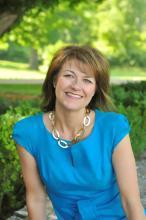Alumni News Outstanding Alumna in Action A conversation with Danielle Clore
Danielle Clore is the Executive Director of the Kentucky Nonprofit Network. KNN was established in 2002 and serves as our state nonprofit association. According to their mission statement, “KNN provides quality education, sharing of best practices and resources, technical assistance, time and money-saving member benefits and a unified public policy voice.” Danielle earned her MPA from the Martin School in 1998. We asked Danielle about her work today and her experiences at the Martin School.
As the Executive Director, Danielle wears many hats from week to week. When we talked a few weeks ago, she was focusing on two big events– KNN’s annual conference, the KY Nonprofit Leadership Forum, and KY Gives Day (December 1). Danielle’s event planning activities include marketing and a lot of communication. For KY Gives Day specifically, Danielle was “finalizing the prize structure for participating nonprofits.”
The upcoming legislative session is also a focus. She works directly with her public policy committee. Danielle develops educational materials for both members and legislators. She was recently nominated for a national award for her role in the creation of a nonprofit Task Force in Frankfort.
In addition to KNN’s seasonal activities, Danielle is also constantly developing the organization. “On a regular basis I’m working with our staff member and contract consultants on membership strategy, communications efforts, overseeing finances, selling sponsorships, working with our grant proposal writer and providing one-on-one technical assistance to nonprofits,” she says.
For students interested in working in nonprofits, take note– fundraising and relationships are key. Danielle explains that “My background prior to KNN was primarily in fundraising, which is essentially relationship building. That’s what I do now almost 100% – relationships with KNN members, legislators and government officials, sponsors, donors, grant makers, colleagues running associations of nonprofits in other states. It’s the most important thing I do.”
Current students should also take heart–“I had coursework in the public policy process, program evaluation and strategic planning for healthcare that I often look back and think, I am sure glad I paid attention!” The skills learned in these classes have added value to her work today. Her Capstone Project focused on something familiar to her– she evaluated a mental health treatment program for severely abused and neglected children for the nonprofit organization she was working for at the time. Her results? Inconclusive! “The data didn’t necessarily show that treatment was/was not effective. I remember being in a panic and Dr. Phil Berger was amazing. He told me, ‘Welcome to research– sometimes these are the results!'” However, her work still had an impact– “the organization tweaked their use of the treatment.”
She continues to learn! Danielle prioritizes attending at least one professional development event every year. Social media and newsletters can create a lot of noise, but apps like Pocket and Evernote help her to track articles on the go for reading later. She shares that, “The nonprofit sector is constantly evolving and keeping up with it all is overwhelming, but it’s a critical part of my job.”
Danielle also emphasizes the importance of her work experiences to discovering your passion as an MPP/MPA student. Her advice to students:
You have to gain work experience. I remember when I graduated with my undergrad degree and thought, hey look at me – I have a degree, time to hire me! Well, that didn’t work out like I’d hoped and that ultimately led me to the Martin School. But the same is true for graduate school – a degree alone, no matter how well suited to the position you are applying for, is not enough. While in graduate school, I worked full time. I realize that’s not ideal for everyone and there were some semesters that were really tough, but I knew exactly where I wanted to focus my career when I graduated because I’d had several positions while in graduate school. Remember that some positions are great to help you find your passion, but other positions can help you decide what you DON’T want to do with your career. Those experiences are just as valuable – and better to find out sooner rather than later! If you aren’t doing an internship or working, even part-time, consider an intensive volunteer assignment. A combination of these will build a strong resume – and you’re going to need it.

